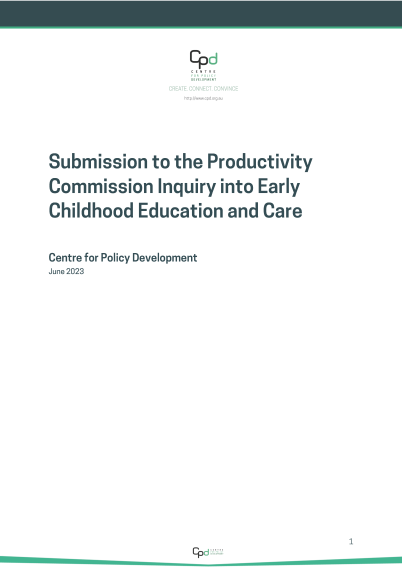Submission to the Productivity Commission Inquiry into Early Childhood Education and Care

Our Early Childhood Development Program recently made a submission to the Productivity Commission’s Inquiry into Early Education & Care that articulates the need for a high-quality universal Early Childhood Education & Care (ECEC) system and recommends a shift for governments, moving from their current roles and approaches to being stewards of the system.
The shift would give every child an entitlement to access an ECEC service, making it a central part of Australia’s social contract, much like schooling and healthcare.
The submission identifies that the current system is not fit for purpose or achieving the outcomes we need it to, and is in need of reform. The reasons for this are interconnected and persistent, including issues related to governance, quality, access, affordability, data, and workforce.
The submission recommends a number of reforms to governance, funding, and delivery, which need to be considered in the context of a connected, holistic early childhood development system. While designing and implementing this system will be complex, Australia does have a solid base from which to build a universal ECEC system that delivers better for children, families, governments and communities.
It argues that universal ECEC would act as the backbone connecting other system elements. A joint state-federal vision, stewardship, and accountability are critical, ensuring that public investments yield returns for children, families, and the nation at large.
Workforce support is noted as a critical enabler for the quality, operation, and reform of the system. This support would involve a comprehensive, whole-of-career approach. It includes higher wages and a system of support that spans the entire career pathway, starting from attracting people into training to supporting upskilling and leadership development.
The submission also highlights the need to redesign the funding system. This would ensure the delivery of quality services, improve equity and provide simplicity for families. An example of a successful model mentioned in the submission is Quebec’s universal, fixed fee system. Initially priced at $5 per day, now $8.85, it has become incredibly popular with families due to its simplicity, reliability, and guaranteed price.
Additionally, the submission calls for extra support in thin markets to bolster service viability. This could include capital investment. It further suggests that services be part of place-based initiatives that address wider child, family, and community needs.
The submission envisions a long-term aim of a universal ECEC system. This system would provide guaranteed, high-quality ECEC at free or low costs to children and families. It would also act as an entry point to the broader early childhood service system, bringing tangible benefits to all Australian families.




